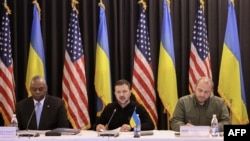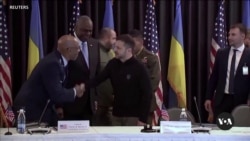Ukrainian President Volodymyr Zelenskyy told military allies meeting Friday in Germany that his country needs the long-range capability to strike deep inside Russian territory “so that Russia is motivated to seek peace.”
“We need to make Russian cities, and even Russian soldiers, think about what they need: peace or Putin,” Zelenskyy told members of the Ukraine Defense Contact Group, a U.S.-led coalition of more than 50 nations that coordinates military support for Ukraine.
It marked the first time that the Ukrainian president had traveled to Ramstein Air Base in Germany to meet with the group.
Zelenskyy noted there has been no change in the U.S. policy, which does not allow Ukraine to use U.S.-supplied weapons to fire on targets deep within Russian territory. The White House has expressed concerns that could draw the United States into direct conflict with Russia.
When asked by reporters about Zelenskyy’s request for U.S. permission to use American-supplied weapons to attack targets farther into Russian territory, U.S. Secretary of Defense Lloyd Austin said there is no single capability that will be decisive in this war.
“Ukraine has a pretty significant capability of its own to address targets that are well beyond the range of ATACMS, or even Storm Shadow for that matter,” he said, referencing two long-range missiles provided by the United States, and the United Kingdom and France, respectively.
He said that he thinks the conflict between Russia and Ukraine will ultimately be “resolved at a negotiating table, but when that point comes is hard to predict.”
“We’re going to continue to work to put Ukraine in the best possible position that it can be in, when and if that day comes in the future,” he said.
However, other allies, such as Canadian Defense Minister Bill Blair, said Friday the coalition should support what he called Zelenskyy’s “very reasonable” request for more means to strike more long-range targets inside Russia, adding that the Ukrainians have made assurances that they would use the weapons in accordance with international law.
The Ukrainian president once again pressed the group for increased air-defense capabilities, as well.
Ukraine has been hit by wave after wave of drone and missile attacks in recent weeks, and Zelenskyy said the need for additional air-defense systems is clear. He thanked the group for the systems it has received but said there are a significant number of air-defense units promised that have not yet been delivered.
“The world has enough, has enough air-defense systems to ensure that Russian terror does not have results,” he said. “And I urge you to be more active in this work with us on air defense.”
German Defense Minister Boris Pistorius told reporters Friday he was “disappointed” with the slow delivery time for the Patriot missile defense systems that were promised for Ukraine at a NATO summit in July.
“Up to now, they haven't yet arrived in Kyiv, and they do need them urgently, especially when it comes to the winter,” he said.
Austin announced a new U.S. military aid package for Ukraine valued at $250 million that includes more ammunition for HIMARS and armored personnel carriers.
At the opening of Friday’s Ukraine Defense Contact Group, Austin said that allies would continue to help Ukraine “fend off Russian aggression today — and deter Russian aggression tomorrow.” He said for its long-term security, however, Ukraine must continue to boost its own defense production.
He added that many contact group members already are supporting that effort, noting Denmark committed some of its latest $115 million security-assistance package to buying arms from Ukraine's defense industry.
Meanwhile, speaking Friday at a news briefing in Norway, NATO Secretary-General Jens Stoltenberg urged Kyiv’s allies to provide Ukraine with more military support, echoing Zelenskyy’s message that a strong Ukraine offers the quickest path to ending the war.
Russian “President [Vladimir] Putin must realize that he cannot win on the battlefield but must accept a just and lasting peace, where Ukraine prevails as a sovereign and independent nation,” the NATO chief said. “I call on all allies to continue their vital support, especially in this difficult phase of the war."
Some information for this report was provided by The Associated Press, Reuters and Agence France-Presse.






